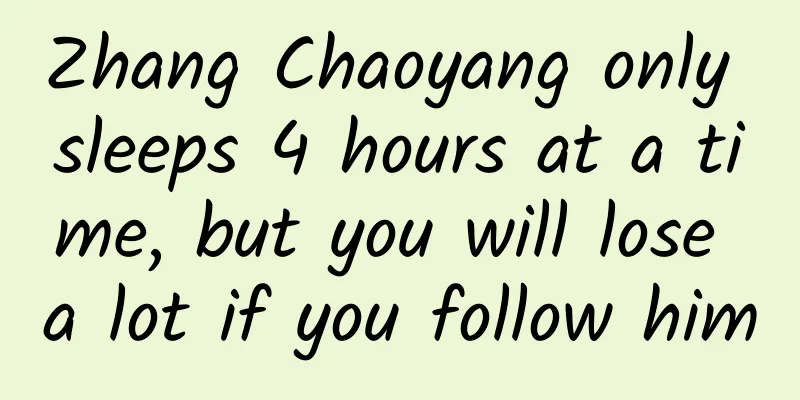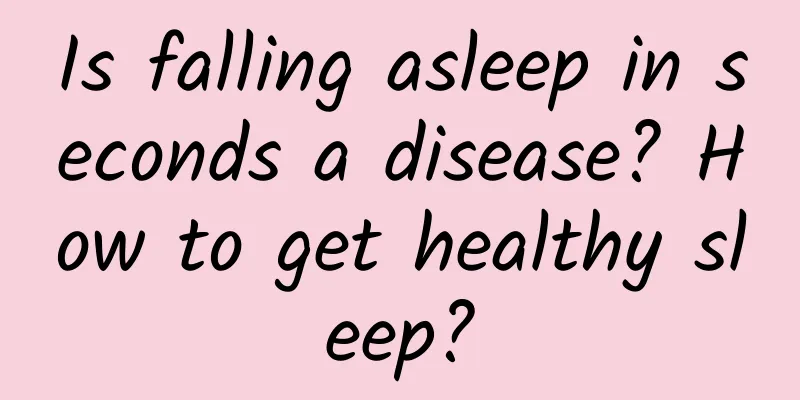Zhang Chaoyang only sleeps 4 hours at a time, but you will lose a lot if you follow him

|
Recently, Zhang Chaoyang talked about the "4-hour sleep method" again during a live broadcast, which attracted the attention of netizens. Zhang Chaoyang said: "If you want to have a deep sleep, you need to shorten your sleep time and sleep only 4 hours instead of 7 hours. After forming a certain pattern, you can fall asleep quickly. Since I sleep less, I can fall asleep quickly. I fall asleep in seconds." Earlier, Zhang Chaoyang also caused controversy for calling on everyone to sleep less. Is Zhang Chaoyang's sleep method scientific? Is it worth learning? NetEase Health interviewed Han Fang, director of the Department of Respiratory Sleep Medicine, chief physician, and professor at Peking University People's Hospital. Let's take a look at the professional doctor's advice on sleep! If you want to have a deep sleep and fall asleep quickly, you have to shorten your sleep time first? Incorrect! Director Han Fang told NetEase Health that good sleep includes three elements: First: Get enough sleep. Generally speaking, the average sleep time for a person should be 7-8 hours. If the sleep time is not enough, it will cause great harm to health. Second: The quality of sleep should be high. The quality of sleep is more important than the length of sleep. Sleep can be deep or light, and deep sleep should account for a sufficient proportion. Humans' need for sleep is the result of tens of millions of years of evolution and cannot be viewed in isolation from individual experience. Third: Sleep should be regular. Regularity does not only mean that the sleep time is consistent every day, but also whether it is in line with nature, that is, "work at sunrise and rest at sunset." Sleep that meets the three elements is healthy sleep. We should not deprive mice of sleep in order to fall asleep quickly. This kind of deprivation was often used in animal experiments in the past. After sleep deprivation, the cognitive function of mice in the experiment also changed. They fell asleep faster, but their long-term immunity collapsed, and their metabolism or cardiovascular system also had problems. "I sleep less so I can't fall asleep. I fall asleep in seconds." In fact, this is "sleep deprivation" Director Han Fang told NetEase Health that "sleeping less and falling asleep in seconds" is actually a compensatory high sleep pressure caused by sleep deprivation. This chronic sleep deprivation will damage people's cognitive function, lead to memory loss and metabolic dysfunction, and in the long run will lead to an increase in the incidence of cardiovascular disease and diabetes. For people who have trouble falling asleep, medicine also uses cognitive behavioral therapy to limit sleep time. However, this kind of sleep restriction does not mean sleeping for a short time, but it means that people should not lie in bed for no reason, should not stay in bed, should not make up for sleep after waking up, and should not take a nap if possible. By gradually adjusting the high-awake state of sleep, the bed and sleep are linked together from a cognitive behavioral level. Is 11 to 3 the best time to sleep? The key to a good sleep is to meet the "sleep cycle" Zhang Chaoyang believes that "11 o'clock at night, 12 o'clock to 3 o'clock in the morning is the best time to sleep. As long as you have deep sleep during this period, you don't need to sleep again afterwards." But Director Han Fang told NetEase Health that the key to good sleep is not how long you sleep or what time you fall asleep, but to satisfy the "sleep cycle." From the perspective of long-term evolution, sleep is the result of human adaptation to the environment. Thousands of years of long-term evolution have made people in harmony with nature and formed biological rhythms: at 7 or 8 o'clock in the evening, when the sun sets, our body's melatonin level will begin to rise, and around 10 o'clock, it will rise to a relatively high level, and it is time to fall asleep; after sleeping, after four or five sleep cycles, at 3 or 4 o'clock in the morning, the level of melatonin secretion is the highest, and deep sleep will also be more at this time; in the morning of the next day, when the light is bright, the level of melatonin secretion gradually decreases, and people will wake up. Director Han Fang said that the period from midnight to early morning is indeed the time when people sleep more deeply, but it is not the best to sleep only in this period. The human body will have some preparation process before entering deep sleep, so it is best to go to bed around ten o'clock. What is the scientifically accepted sleep duration? When is considered staying up late? Director Han Fang told NetEase Health that large-scale population studies have shown that 7-8 hours of sleep is more appropriate for adults, and good sleep must also meet the requirements of good sleep quality and regularity. Relatively speaking, children may need longer sleep. Newborn babies need ten to twenty hours of sleep a day, while adolescents or children need about 9-10 hours. Children of different ages have different needs. The sleep structure of the elderly may change, and brain waves may change, but the sleep duration is also needed to be 7-8 hours. If it is less than 6 hours, the mortality rate and incidence of complications will increase over time, and the same is true for more than 10 hours. If we look at it on a coordinate system, the relationship between sleep and health, especially the relationship between sleep duration and health, is a U-shaped relationship, not a linear relationship. As for the concept of staying up late, one refers to going to bed late, and the other refers to irregular sleep. Going to bed early and getting up late, going to bed late and getting up late, and making up for sleep are all unhealthy sleep and all belong to staying up late. A reminder: Don’t learn the “4-hour sleep method”! Director Han Fang said that the "4-hour sleep method" is beneficial to the body and not harmful. Some people think that sleeping this way is good, which may be due to individual differences, but for the vast majority of people, it is not worth promoting. Everyone has different living habits and work habits, and the "4-hour sleep method" is not worth following. Finally, NetEase Health would like to remind everyone that we work to live, not live to work. When you sacrifice your health for so-called success, don’t forget to ask yourself whether it is really worth it. |
>>: Small stye, big trouble, pay attention to this common eye disease in spring!
Recommend
What food is better for breast enhancement?
Breast enhancement is a lifelong career for women...
Sudden decrease in fetal movement at 5 months of pregnancy
Fetal movement is an indicator of the baby's ...
Itching during menstruation
Women are very vulnerable during their menstrual ...
What to do if your vaginal discharge is brown after your period ends
Many women experience brown discharge after their...
What to eat after curettage
If a woman does not want to become a mother as so...
Medical abortion is considered clean after 25 days
Medical abortion is a very convenient, but also v...
Can I get pregnant if I have sex before my period is over?
Some female friends choose to have sex when their...
How much do you know about food nutrition | Can eating fruit before meals to control appetite help you lose weight? Pay attention to these things to be effective
Eating fruit before meals may be a way to control...
How to use moxibustion to treat tinnitus? What tools are better for moxibustion of tinnitus?
Moxibustion is effective for tinnitus. Tinnitus i...
Do women bleed the first time?
Some male friends will judge whether their women ...
How to tell if rice cakes are bad? Are rice cakes high in calories?
Rice cakes contain nutrients such as protein, fat...
The more spicy food a place has, the more anorectal hospitals there are?
Local climate and soil nurture local people, but ...
What preparations should be made before pregnancy?
Women all have to have children, only then can th...
Is it better for pregnant women to drink milk powder in the morning or at night?
Pregnant women should pay attention to some issue...
After petting a cat, a woman was admitted to the ICU due to respiratory failure! The culprit is shocking
Cat petting is one of life's great pleasures ...









